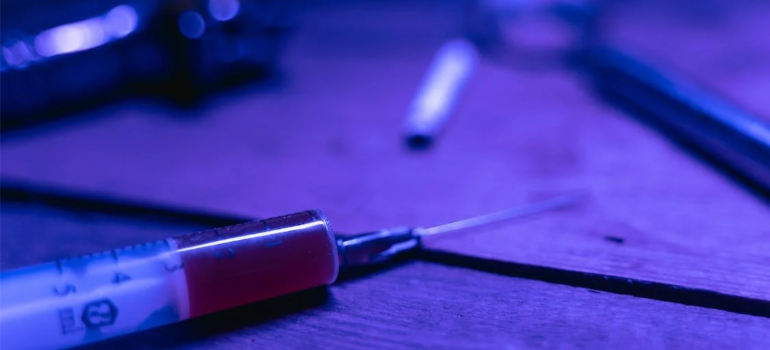Meth Rehab
Harmony Ridge offers comprehensive guidance on quitting meth and achieving recovery. If you or a loved one needs support in overcoming meth use, reach out to us to explore the path to a healthier and brighter future.
Methamphetamine, more commonly known as meth, is an incredibly addictive illicit drug that sees unfortunately high misuse rates. Between its massive potential for misuse and powerful euphoric effects, it may be among the hardest drugs to break free from. At Harmony Ridge Recovery, we have treated addiction to this drug manifold over the years. We are deeply aware of its characteristics, its many risks, and the value of swift treatment. If you’re looking for professional services for meth rehab West Virginia has to offer, we are confident we can help you or a loved one on this difficult journey.

What is Methamphetamine?
Methamphetamine, also known as meth, is an addictive and potent central nervous system stimulant. It is similar chemically to various other amphetamines. Amphetamines such as Dexedrine and Adderall are used often to treat narcolepsy and attention deficit hyperactivity disorder (ADHD). Meth is highly addictive though, thus people that use it often need to attend meth rehab.
Some people use meth to help them manage obesity or short-term weight loss. Commonly, meth is utilized in forms such as crystal meth illicitly.
Originally, methamphetamine was incorporated in society in the early 20th century to help people with their trouble breathing and nasal congestion. During the passage 1970 of the Controlled Substances Act, methamphetamine, as well as many other stimulants, such as cocaine and amphetamine, became Schedule II drugs. That means that there was a high potential for abuse for these drugs that could lead to severe psychological dependence.
The National Survey on Drug Use and Health estimates that 2 million Americans utilized methamphetamine in the past year that were 12 years or older. Therefore, meth is the second most commonly used illicit stimulant.
The Impact of Meth Addiction
Dating as far back as the 19th century and having seen widespread use in World War 2, today meth fuels addictions in the United States and worldwide. It is a powerful drug as it causes intense feelings of euphoria which fuel addiction. Prolonged use effectively changes the brain, increasing the intensity of cravings and inhibiting potential attempts to break free of dependence. Like many other drug addictions, high relapse rates are often common with meth abuse. If one does attempt to stop abusing meth, intense cravings and withdrawal symptoms make it a monumental task.
To substantiate the impact of meth addiction, here we may explore some statistics on each major category. These statistics inform how virtually every meth rehab center West Virginia offers approaches meth addiction, so they’re indeed notable.
Prevalence and Use
Unfortunately, methamphetamine abuse is at an astonishing growing rate. The National Institute on Drug Abuse (NIDA)’s statistics found that:
- In 2020, 0.9% (or about 2.6 million people) of people aged 12 or older reported using methamphetamine in the past 12 months.
- In 2021, an estimated 0.2% of 8th graders, 0.2% of 10th graders, and 0.2% of 12th graders reported using methamphetamine in the past 12 months.
- Among people aged 12 or older in 2020, an estimated 0.6% (or about 1.5 million people) had a methamphetamine use disorder in the past 12 months.
In light of these numbers, methamphetamine is one of the most addictive substances in the US today. So much so, that methamphetamine made it into the American Addiction Centers’ (AAC) list of most addictive drugs.

Misuse and Combinations
In addition to its high addiction rates and prevalence, meth carries the risk of extensive misuse as well. It can be consumed in a variety of ways and is often combined with other drugs to elicit more pleasure. Nearly every meth rehab center West Virginia offers can attest to this unfortunate reality.
NIDA reports that “the preferred method of using the drug varies by geographical region and has changed over time”. Consumption of methamphetamine can be:
- Smoked
- Snorted
- Injected
- Orally ingested
In addition, the Centers for Disease Control and Prevention (CDC) find alarming patterns of drug combinations. A study by Christopher M. Jones, PharmD, DrPH, Wilson M. Compton, MD2, and Desiree Mustaquim, MPH, outlines the following:
- Cannabis use (68.7%)
- Prescription opioid misuse (40.4%)
- Cocaine use (30.4%)
- Prescription sedative or tranquilizer misuse (29.1%)
- Prescription stimulant misuse (21.6%)
- Heroin use (16.9%)
- Past-month binge drinking (46.4%)
- Nicotine dependence (44.3%)
Finally, the same study outlines the prevalence of dual diagnosis; the co-occurrence of substance use disorders and mental health disorders.
“Mental illness was common also; of persons who used methamphetamine, an estimated 57.7% reported any mental illness, and 25.0% reported serious mental illness during the past year”.

Overdose and Dangers
In combination, the above factors make meth addiction incredibly dangerous. While short-term effects can be intensely pleasurable, long-term effects can prove debilitating.
AAC’s DrugAbuse notes the following physical risks, among others:
- High heart rate
- High blood pressure
- Weight loss
- Skin picking
- Skin infection or abscess (esp. if used intravenously)
- Elevated body temperature
- Poor dental health
- Convulsions
- Stroke
In addition, NIDA notes an array of psychological effects, including:
- Psychosis; paranoia, hallucinations, repetitive motor activity
- Changes in brain structure and function
- Deficits in thinking and motor skills
- Increased distractibility
- Memory loss
- Aggressive or violent behavior
- Mood disturbances
Should these not suffice to seek meth rehab in West Virginia, NIDA also notes that overdose rates continue to increase:
“National overdose deaths involving psychostimulants with abuse potential (including methamphetamine) […] rose from 547 in 1999 to 23,837 in 2020. […] The number of deaths involving psychostimulants has increased steadily since 2014 regardless of opioid involvement.”
Finally, DrugAbuse reports that “meth relapse statistics indicate that about 61% of meth users will relapse within 1 year of finishing substance abuse treatment”. These rates are notably 1% higher than the upper range (40-60%) most statistics provide for general drug relapse rates. As such, meth addiction appears to also come with considerably high relapse rates, further endangering the individual over time.

What are the Short and Long-Term Effects of Using Meth?
There are many short and long-term effects of using methamphetamine that transpires after a given period. When an individual uses methamphetamine, it can result in dependence on the drug and addiction. As those two entities occur, they can end up being harmful to your mind and body over time.
Dependence and addiction to substances can create changes in a person’s brain that can endure long periods of time. The effects are sometimes partially reversible. The chronic effects of meth use at east are:
Long-Term Effects of Meth
- Lung issues such as bronchitis, pneumonia, and a cough in individuals who smoke meth
- Increased risk of contracting HIV and hepatitis in those who inject meth, “track marks”
- Nose bleeds, perforated septum in individuals who snort meth, nasal irritation
- Cardiovascular issues such as irregular heartbeat, cardiac arrest, and palpations
- Major dental issues such as tooth decay, loss of teeth, and gum disease
- Parkinson’s disease and increased risk of stroke
- Malnutrition and excessive weight loss
- Aggressive or violent behavior
- Damage to the cells of the brain
- Sores on the skin
- Trouble sleeping
- Memory loss
- Mood swings
- Seizures
- Anxiety
What are the Signs and Symptoms of Meth Addiction?
There are various signs, symptoms, and side effects of meth addiction. It’s crucial to note that only a physician can diagnose a substance use disorder (SUD). To be diagnosed with a meth stimulant use disorder, an individual would have to display within 1 year at least 2 of the following symptoms:
Symptoms of Meth Addiction
- An inability to stop using meth, even after methamphetamine has caused or even worsened mental, interpersonal, or physical issues
- Developing a tolerance to meth effects, where you need to use more of the drug to feel the same effects
- Experiencing trouble trying to complete what needs to be done at school, work, or home because of meth
- Having the desire to cut back or stop engaging in meth use but not being able to
- Spending a lot of time getting or using meth or crashing after a binge
- Experiencing withdrawal symptoms once you stop using the drug
- Using methamphetamine in dangerous situations, such as driving
- Cutting back or quitting on hobbies as a result of meth use
- Taking or using more meth than what was planned
- Experiencing strong meth cravings
Signs of Meth Addiction
The following are signs of meth addiction to be made aware of if you are worried that you or someone you know might have a meth addiction.
- Burns on lips and fingers from smoking, track marks from injecting, and nose bleeds from snorting
- Isolating oneself from family and friends, or spending time with new friends
- Major behavior changes that occur quickly
- Moving and talking more than usual
- Scratching at skin causing sores
- Sleep and eating habit changes
- Aggressive or chaotic behavior
- Significant weight loss
- Fast, rambling speech
- Excessive energy
- Dilated pupils
- Mood swings
Psychosis and Anhedonia
Chronic use and high doses of methamphetamine are associated with two long-term health concerns: anhedonia and psychosis. Anhedonia is a diminished pleasure or interest in previously rewarding or enjoyable activities.
There is a theory suggesting that changes occurring in the reward and pleasure centers of the brain happen as a result of meth. In turn, meth can play a role in protracted anhedonia in former individuals who engaged in meth.
Methamphetamine also can result in drug-induced psychosis and psychotic symptoms. Drug-induced psychosis studies suggest that individuals who intravenously use or have a family history of psychosis are at an increased risk. Although psychiatric symptoms generally resolve themselves within a week of abstinence, there are some individuals whose symptoms last longer. It is possible that symptoms can reoccur during times of stress.
Psychosis Signs
- Hallucinations (hearing, seeing, or feeling things that aren’t truly there, such as being completely convinced that bugs are crawling underneath your skin)
- Delusions (receiving messages through the television and radio and being convinced that they are real)
- Repetitive motor activity
- Paranoia
The Importance of Getting Into a Meth Rehab West Virginia Facility
With all of the above in mind, it should be self-evident that meth rehab can be life-saving. The sooner you can identify an addiction problem, in yourself or a loved one, the better the chances that rehab can succeed with fewer challenges.
To consolidate the above, and highlight the significance of early medical assistance, here we may pinpoint the following:
- Methamphetamine is highly addictive. Between pure methamphetamine use and combinations with other drugs, this type of addiction can take hold very quickly. Misuse can escalate into addiction within a very short time.
- Addiction to methamphetamine can be debilitating. Like all drug addictions, methamphetamine addiction comes with an array of debilitating physical, psychological, and emotional effects. Direct harm aside, these can weaken and isolate the individual, causing their addiction to spiral further.
- Breaking free from addiction is typically extremely hard. Between its highly addictive nature and powerful withdrawal symptoms, methamphetamine is notoriously difficult to break free from. For these reasons, detox without medical assistance tends to fail and often entails health risks.
- Methamphetamine addiction has notably high relapse rates. Even if one does break free from addiction, relapse rates for methamphetamine addiction paint a bleak picture. The only proven way to reduce these rates is a robust aftercare program offered by rehab centers.
Finally, every case of addiction differs substantially from the next, as every meth rehab center West Virginia offers can attest to. Underlying addiction drivers, co-occurring mental health disorders, different levels of peer support, and other factors make rehab a very demanding process. As such, words of encouragement and online advice don’t suffice; most cases of addiction require rehab to fully and thoroughly address.

How Does Our Addiction Program Work?
Still, even if you’re now convinced of the necessity of rehab, you may wonder what it looks like. This is completely natural and understandable; very few of us actually know what rehab entails.
Rehab programs will differ somewhat, depending on both the individual case of addiction and the treatment providers. At Harmony Ridge, we offer an addiction program that is both flexible enough to cater to each case’s unique needs and rigid enough to apply all necessary evidence-based treatments our field relies on.
To elaborate, here we may walk you through the process step by step. Remember, this is an outline of our program specifically; if you opt for another meth rehab West Virginia provider your experience may differ.
Detox
First, our programs for all addictions begin with medication-assisted treatment (MAT) at our medical detox center. You may have seen this process referred to as “medically assisted detoxification” and similar terms, but they all refer to the same practice. That is, allowing the individual to detox with medical assistance and under medical supervision.
This process tends to last for one to two weeks, but for meth specifically, it may need to extend further. During this time, the patient receives appropriate medications approved by the Food and Drug Administration (FDA). As they do, they remain under close supervision and receive tailored help from medical professionals to manage cravings and withdrawal symptoms.

Meth rehab programs
Once detox has concluded successfully, the individual can proceed to main rehab programs. At Harmony Ridge, our main offerings for this step to recovery are the two that follow.
- Residential programs. Also known as Inpatient programs, these entail staying at a clinical facility. Our residential program offers the most intensive care, alongside clinical services in a safe and welcoming environment without distractions. It is often the immediate next step after MAT.
- Intensive Outpatient Programs. For milder cases, or after Residential programs or PHPs, our meth rehab center West Virginia also offers an Intensive Outpatient Program (IOP). As the name suggests, IOPs remain intensive in their focus on therapy, while allowing the individual to stay at home.
If you need further information on each type of program, you may follow the links above to know more.
Aftercare
The final step of rehab for any reputable meth rehab center West Virginia trusts is aftercare, and we at Harmony Ridge are firm believers in its immense benefits. Research asserts that a robust aftercare program can reduce relapse rates, and our years of experience confirm these findings.
The foundations for aftercare programs are actually laid throughout each journey to recovery, starting with MAT. Aftercare programs can vary considerably, depending on each case’s needs, but typically include:
- 12-step program participation
- Connection with a sponsor
- Alumni programs
- Individual and family therapy
- Outings with one’s peers
In all cases, aftercare seeks to strengthen the individual as they enter a new chapter in their life. It stresses open communication channels with therapists for timely interventions as needed, and builds on peer support.

What Can You Expect from Harmony Ridge Recovery Center?
As such, what you can expect from your stay with us should be nothing short of perfection. This may seem boastful to say, but our philosophy mandates that we strive for perfection as we help combat the nationwide addiction epidemic.
To achieve this goal, we offer:
- A safe, welcoming clinical environment. Across MAT, Residential, and PHP programs, our clinical facilities come fully equipped for even the most severe cases. Away from distractions and with unwavering support from our clinicians, you can expect this hard phase to go by pleasantly.
- Unique journeys tailored to your needs. Each case differs, and as the best meth rehab center West Virginia offers we are keenly aware of that. We do not offer rigid one-size-fits-all programs, but follow each journey closely and adjust our course to always meet its needs.
- Specialized therapies for different demographics. Personal needs often also align with the unique needs of specific demographics, such as those of pregnant women or veterans. For this reason, we adjust our programs and therapies and offer unique services as needed to best account for this.
- Evidence-based therapies. Flexible does not mean unstructured, however, so our practices always follow the literature of our field. We do not experiment with rehab, but employ the most robust addiction therapy techniques with demonstrable, proven effectiveness.
- Experienced, certified staff. Finally, every program is only as effective as the treatment providers who run it. Our team consists entirely of certified professionals, all experienced in their respective fields, to ensure our clients receive the level and quality of care they need.

Therapies Our Meth Rehab Center WV Offers
Some of these points we’ve outlined above, but some may require some more elaboration. Here, for instance, we may cover the types of therapy we offer in more specific terms. If you do choose us for your meth rehab in West Virginia, you may need this kind of information in advance to offer you more peace of mind.
First and foremost, all of our programs feature a keen focus on therapy in different contexts. Namely:
In addition, our programs employ the four most effective types of addiction therapy as needed:
- Cognitive Behavioral Therapy (CBT)
- Dialectic Behavior Therapy (DBT)
- Rational Emotive Behavior Therapy (REBT)
- Eye-Movement Desensitization and Reprocessing (EMDR)
A single program may not employ all of the above, of course, but this wealth of options offers immense flexibility. If one type or context of therapy does not sufficiently meet your needs, we can seamlessly transition to another on a case-by-case basis, leaving nothing to chance.

Tailored Treatments for Different Demographics
This range of tools is also highly necessary to cater to the needs of different demographics, as outlined above. There are multiple demographics that typically or by definition have different needs as regards rehab, and our focus on this factor makes us the meth rehab center West Virginia trusts. To cater to these different needs we offer:
- Rehab for professionals, who may need to maintain their employment
- Rehab for pregnant women, who face unique physical and often mental circumstances
- Intensive rehab for young adults, who may wish to pursue academic goals or employment
- Rehab for seniors, who may require additional care
- Rehab for veterans, who often have to wrestle with trauma
Whether you’re seeking rehab for loved ones or yourself, you can rest assured we approach every case with utmost care. Every journey to recovery differs, and we are fully prepared to tailor our services for each one.

Harmony Ridge Offers Treatment for Dual Diagnosis
Finally, as highlighted above, our programs come with a keen focus on dual diagnosis as well. Co-occurring mental health disorders may often fuel addiction or be fueled by it, creating a vicious cycle of catastrophic effects.
Mental health disorders that our professionals can diagnose and tailor treatments to include:
- Anxiety
- Bipolar disorder
- Depression
- Eating disorders
- Personality disorders and borderline personality disorders
- Schizophrenia
- Trauma
- Autism
- OCD
- ADHD
- PTSD
Needless to say, each such diagnosis will substantially affect the program’s course. With this knowledge in hand, we can best tackle the underlying causes of addiction and personalize rehab accordingly.

Contingency Management Interventions and Motivational Incentives
This form of behavioral therapy can answer the following questions, “How to quit meth?” And “How to help a meth addict?” These behavioral therapies are when tangible rewards reinforce positive behaviors such as not using and attending treatment sessions.
The beauty of these helpful behavioral therapies lies in helping people recover from meth addiction and achieve meth recovery. Meth addiction recovery is extremely attainable. As the individual stays sober, the rewards have the potential to increase in value.
The Matrix Model
This form of therapy incorporates the following all geared towards meth addiction recovery.
- Positive reinforcement of desirable behaviors such as attending treatment and avoiding substance use
- Encouragement to participate in 12-Step meetings
- Family therapy and education
- Behavioral therapy
- Individual therapy
- Drug testing
Cognitive Behavioral Therapy
If you are currently asking yourself, “How to quit meth?” And “How to help a meth addict?”Meth rehab has the power to prevent relapse by increasing awareness of the following:
- Changing harmful behaviors
- Developing coping skills
- Overall meth recovery
- High-risk situations
- Managing cravings
Insurance Coverage for Getting Treatment
If this array of services makes you worry about potential costs, fear not. Our meth rehab West Virginia services typically fall under considerable insurance coverage, as we accept all major insurance providers, including:
Still, not all cases may be equally or fully covered by insurance. Such factors as exact treatment duration, exact services required, and insurance plans themselves may affect final coverage. As such, we strongly encourage you to contact our representatives at (855) 942-3797 for a full review of your insurance plan and financing options. We will thoroughly and confidentially verify your benefits with your insurance provider, and explore all your options so you can make an informed decision.
Why Choose Harmony Ridge Recovery Center?
With all of the above in mind, here we can consolidate all of our unique offerings which can make us the best choice for you or your loved ones.
- Personalized care. Our philosophy mandates that we approach each case individually and cater to its unique needs. From providing appropriate levels of care to addressing all addiction drivers, we offer unmatched flexibility.
- An array of treatment options. As each case differs, we come fully equipped to handle all addiction needs with a wealth of treatment options. In combination, our programs and therapies leave nothing to chance.
- A unique location. A key benefit of meth rehab West Virginia offers lies in its location, and our facilities exemplify this. Our locations offer a reconnection with nature, which facilitates easier healing of mind and body.
- Robust aftercare. In a crucial phase of recovery, our extensive aftercare programs serve to ward off relapse. With open communication channels and a robust support network, we seek to provide lasting, true rehabilitation.
As regards our location specifically, pictures are indeed worth a thousand words. If you’d like to see our locations in advance you may visit our photo gallery or take a video tour of our facilities.

Contact Us & Start Your Journey Today!
In summary, meth addiction can be devastating if left unchecked. It can put you or your loved ones at serious physical risk, cause and aggravate mental health disorders, and grip your everyday life. Still, despite its severity, meth addiction is treatable, and treatment only improves over the years.
The first step toward rehab can seem intimidating, but it doesn’t have to be. With proper care and continuous support every step of the way, freedom from addiction is an attainable goal worth pursuing. At Harmony Ridge, our unyielding dedication to personalized, thorough rehabilitation will ensure we offer you a seamless, memorable experience. If you now feel ready to take the first step toward a new life, please contact us today and start the journey to recovery.
FAQ
Why is meth so addictive?
Meth has very powerful euphoric effects, which effectively change the brain and fuel cravings. In addition, it comes in different forms with different methods of consumption, which can often be combined with other addictive drugs. Withdrawal symptoms are often severe, preventing the individual from escaping their addiction.
Which are the typical meth withdrawal symptoms?
Exact withdrawal symptoms vary, as with all addictive substances and drugs, but those of meth tend to be notable and powerful. The most common physical ones include:
- Tremors
- Twitches
- Sweating
- Fever
- Nausea
- Insomnia
- Dehydration
Psychological symptoms are arguably worse, as they often include:
- Anxiety
- Severe depression
- Agitation
- Paranoia
- Hallucinations
- Suicidal thoughts
In addition, indirect effects of withdrawal symptoms can include domestic tensions and violence, criminal behavior and incarceration, isolation from one’s peers, and more. These will typically, but not exclusively, stem from psychological symptoms and their immediate effects on the individual.
For a more extensive list of all potential symptoms you may consult the ones cited above, and AddictionCenter’s meth withdrawal timeline article.
Can I detox from meth by myself?
For all of the reasons highlighted above, we strongly suggest not attempting to detox without medical assistance and supervision. For one, failure alone can discourage additional attempts with professional help. Worse still, severe withdrawal symptoms can put you at serious risk of harm.
This is true for most addictions but is especially notable for such powerful drugs as meth. No matter which professionals you seek help from, we strongly encourage you to only attempt to detox under strict medical supervision. Doing so will ensure you get all the support you need and guarantee your safety.
How long does meth rehab take?
The exact duration of meth rehab is very hard to predict, as each case will differ from the next. The total duration will be the sum of all programs your case requires, which will have to vary to best meet your needs.
In order, you may expect the following durations for each phase:
- Detox tends to last for 1-2 weeks, but for meth specifically, it may need to extend to 3-4 weeks.
- Inpatient programs tend to last for 1-3 months, but they also tend to vary more than most programs.
- Partial Hospitalization Programs tend to last for 2-4 weeks, depending on the case.
- Intensive Outpatient Programs tend to last for 1-4 months.
Still, please remember that these are only common durations. Rehab may last less or considerably more depending on an array of factors, as highlighted above.
How much does meth rehab cost?
Final rehab costs also tend to vary significantly, too much so for us to provide any meaningful estimate here. Key factors that affect final costs include:
- The duration of each program
- The exact services and medications required
- Health insurance coverage
Determining rehab costs should best be left to you and your treatment providers. Most rehab centers will inform you of likely costs in advance, and many will review your health insurance coverage as well. If you do choose Harmony Ridge we will offer thorough assistance in this regard, as well as with any arrangements you may need such as for loved ones to pay for your treatment.
Is relapse avoidable?
Not completely, no; unfortunately, we can never rule out a potential relapse. Despite constant improvement over the years, addiction treatment has still not found an effective way to nullify the chances of relapse. Rates have decreased, but remain notably high across all types of addiction.
That said, research continues to confirm that thorough rehab and robust aftercare programs can reduce this likelihood considerably. While no approach seems capable of preventing relapse outright just yet, every step in this direction can prove invaluable.
References:
https://americanaddictioncenters.org/meth-treatment
https://www.sciencedaily.com/releases/2013/01/130110094415.htm
https://nida.nih.gov/publications/research-reports/methamphetamine/what-scope-methamphetamine-misuse-in-united-states
https://americanaddictioncenters.org/adult-addiction-treatment-programs/most-addictive
https://nida.nih.gov/publications/research-reports/methamphetamine/how-methamphetamine-misused
https://www.cdc.gov/mmwr/volumes/69/wr/mm6912a1.htmhttps://drugabuse.com/drugs/methamphetamine/history-statistics/
https://nida.nih.gov/publications/research-reports/methamphetamine/what-are-long-term-effects-methamphetamine-misuse
https://drugabuse.com/drugs/methamphetamine/relapse/
https://nida.nih.gov/publications/principles-drug-addiction-treatment-research-based-guide-third-edition/frequently-asked-questions/how-long-does-drug-addiction-treatment-usually-last
https://www.addictioncenter.com/drugs/meth/withdrawal-detox/
Jump To Section
Begin Your Journey to Healing Here
Ask me about recovery, I can help you!
Our recovery specialists are standing by 24/7 to help you or your loved one.
Or call us: 


